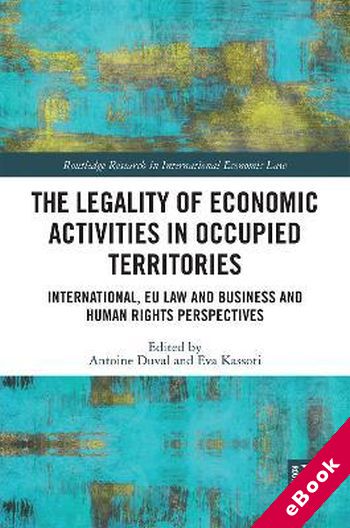
The device(s) you use to access the eBook content must be authorized with an Adobe ID before you download the product otherwise it will fail to register correctly.
For further information see https://www.wildy.com/ebook-formats
Once the order is confirmed an automated e-mail will be sent to you to allow you to download the eBook.
All eBooks are supplied firm sale and cannot be returned. If you believe there is a fault with your eBook then contact us on ebooks@wildy.com and we will help in resolving the issue. This does not affect your statutory rights.
This edited volume explores the question of the lawfulness under international law of economic activities in occupied territories from the perspectives of international law, EU law, and business and human rights.
Providing a multi-level overview of relevant practices, policies and cases, the book is divided in three parts, each dealing with how different legal fields have come to grips with the challenges brought about by the question of the lawfulness under international law of economic activities in occupied territories. The first part includes contributions pertaining to the international law dimension of the question. It contains chapters on the conjunction between jus in bello, jus ad bellum and international human rights law in the context of exploitation of natural resources in territories under belligerent occupation; on third party obligations flowing from the application of occupation law in relation to natural resources exploitation; and on State practice with regards to trading with occupied territories. The second part focuses on EU law and contains contributions that assess the EU’s approach to occupied territories and the extent to which this approach comports with the EU’s obligations under international law; contributions providing an in-depth assessment of the case-law of the CJEU on occupied territories; as well as contributions pertaining to the political considerations that may influence the legal framing of questions pertaining to occupied territories. The final part focuses on the business and human rights perspective, with chapters on investment arbitration as a means for holding the occupant accountable for its conduct towards foreign investments and investors; on the role and impact of the soft law framework governing corporate activity (such as the UN Guiding Principles) on business involvement with occupied territories; as well as a final case study on the dispute involving Israeli football activity in settlements located in the OPT and the legal responsibility of FIFA in this regard.
The book will appeal to academics, practitioners and policy-makers alike.